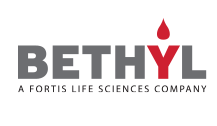Rabbit anti-Human IgM-Fc Antibody Biotinylated

Product Details
Specifications
Request Formulation Change Phosphate Buffered Saline (PBS) containing 0.2% BSA and 0.05% Pro-Clean 400
Request Formulation Change Phosphate Buffered Saline (PBS) containing 0.09% Sodium Azide
Request Formulation Change
Prior to conjugation, immunoglobulin concentration was determined using Beer’s Law where 1mg/mL IgG has an A280 of 1.4.
By immunoelectrophoresis and ELISA this antibody reacts specifically with human IgM. Cross reactivity with other immunoglobulins and light chains is less than 1%. This antibody may cross react with IgM from other species.
Biotinylated antibody was demonstrated by reaction with avidin/peroxidase when coated on microtiter wells. Working dilutions should be determined by the investigator. Antiserum was solid phase adsorbed to ensure class specificity. The antibody was isolated by affinity chromatography using antigen coupled to agarose beads and conjugated to horseradish peroxidase (HRP).
Prior to conjugation, immunoglobulin concentration was determined using Beer’s Law where 1mg/mL IgG has an A280 of 1.4. Molar enzyme/antibody protein ratio is 4:1.
By immunoelectrophoresis and ELISA this antibody reacts specifically with human IgM. Cross reactivity with other immunoglobulins and light chains is less than 1%. This antibody may cross react with IgM from other species. Antiserum was solid phase adsorbed to ensure class specificity. The antibody was isolated by affinity chromatography using antigen coupled to agarose beads.
Immunoglobulin concentration was determined using Beer’s Law where 1mg/mL IgG has an A280 of 1.4.
By immunoelectrophoresis and ELISA this antibody reacts specifically with human IgM. Cross reactivity with IgA, IgG and light chains is less than 1%. This antibody may cross react with IgM from other species. Antiserum was solid phase adsorbed to ensure class specificity. The antibody was isolated by affinity chromatography using antigen coupled to agarose beads and conjugated to fluorescein isothiocyanate (FITC).
Prior to conjugation, immunoglobulin concentration was determined using Beer’s Law where 1mg/mL IgG has an A280 of 1.4.
By immunoelectrophoresis and ELISA this antibody reacts specifically with human IgM. Cross reactivity with other immunoglobulins and light chains is less than 1%. This antibody may cross react with IgM from other species. Antiserum was solid phase adsorbed to ensure class specificity. The antibody was isolated by affinity chromatography using antigen coupled to agarose beads and conjugated to DyLight® 488.
Prior to conjugation, immunoglobulin concentration was determined using Beer’s Law where 1mg/mL IgG has an A280 of 1.4.
By immunoelectrophoresis and ELISA this antibody reacts specifically with human IgM. Cross reactivity with other immunoglobulins and light chains is less than 1%. This antibody may cross react with IgM from other species. Antiserum was solid phase adsorbed to ensure class specificity. The antibody was isolated by affinity chromatography using antigen coupled to agarose beads and conjugated to DyLight® 550.
Prior to conjugation, immunoglobulin concentration was determined using Beer’s Law where 1mg/mL IgG has an A280 of 1.4.
By immunoelectrophoresis and ELISA this antibody reacts specifically with human IgM. Cross reactivity with other immunoglobulins and light chains is less than 1%. This antibody may cross react with IgM from other species. Antiserum was solid phase adsorbed to ensure class specificity. The antibody was isolated by affinity chromatography using antigen coupled to agarose beads and conjugated to DyLight® 594.
Prior to conjugation, immunoglobulin concentration was determined using Beer’s Law where 1mg/mL IgG has an A280 of 1.4.
By immunoelectrophoresis and ELISA this antibody reacts specifically with human IgM. Cross reactivity with other immunoglobulins and light chains is less than 1%. This antibody may cross react with IgM from other species. Antiserum was solid phase adsorbed to ensure class specificity. The antibody was isolated by affinity chromatography using antigen coupled to agarose beads and conjugated to DyLight® 650.
Prior to conjugation, immunoglobulin concentration was determined using Beer’s Law where 1mg/mL IgG has an A280 of 1.4.
By immunoelectrophoresis and ELISA this antibody reacts specifically with human IgM. Cross reactivity with other immunoglobulins and light chains is less than 1%. This antibody may cross react with IgM from other species.
Additional Product Information
IgM is found primarily in serum and is the first antibody made to fight infections. Anti-heavy chain antibodies are designed to react with only the heavy chain of the Ig molecule and remove reactivity to the light chain. The anti-Fc activity ensures activity only to the Fc portion of the IgG molecule and not the Fab fragments on the light chain.
Applications
Not all listed applications have been specifically tested by our laboratory.
DyLight® 488 is excited at 493 (in PBS) and emits at 518 (in PBS).
DyLight® is a trademark of Thermo Fisher Scientific Inc. and its subsidiaries.
DyLight® 550 is excited at 562 (in PBS) and emits at 576 (in PBS). DyLight® 550 replaces DyLight® 549.
DyLight® is a trademark of Thermo Fisher Scientific Inc. and its subsidiaries.
DyLight® 594 is excited at 593 (in PBS) and emits at 618 (in PBS).
DyLight® is a trademark of Thermo Fisher Scientific Inc. and its subsidiaries.
DyLight® 650 is excited at 652 (in PBS) and emits at 672 (in PBS). DyLight® 650 replaces DyLight® 649.
DyLight® is a trademark of Thermo Fisher Scientific Inc. and its subsidiaries.
